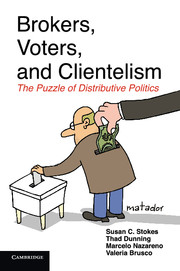Book contents
- Frontmatter
- Dedication
- Contents
- List of Tables
- List of Figures
- Preface and Acknowledgments
- I MODALITIES OF DISTRIBUTIVE POLITICS
- II THE MICRO-LOGIC OF CLIENTELISM
- III THE MACRO-LOGIC OF VOTE BUYING: WHAT EXPLAINS THE RISE AND DECLINE OF POLITICAL MACHINES?
- IV CLIENTELISM AND DEMOCRATIC THEORY
- Appendix A: Argentina Brokers' Survey
- Appendix B: Argentina Voters' Surveys
- Appendix C: Venezuela Voters' Survey and the Maisanta Database
- Appendix D: India Voters' Survey
- References
- Index
- Miscellaneous Endmatter
Preface and Acknowledgments
Published online by Cambridge University Press: 05 June 2014
- Frontmatter
- Dedication
- Contents
- List of Tables
- List of Figures
- Preface and Acknowledgments
- I MODALITIES OF DISTRIBUTIVE POLITICS
- II THE MICRO-LOGIC OF CLIENTELISM
- III THE MACRO-LOGIC OF VOTE BUYING: WHAT EXPLAINS THE RISE AND DECLINE OF POLITICAL MACHINES?
- IV CLIENTELISM AND DEMOCRATIC THEORY
- Appendix A: Argentina Brokers' Survey
- Appendix B: Argentina Voters' Surveys
- Appendix C: Venezuela Voters' Survey and the Maisanta Database
- Appendix D: India Voters' Survey
- References
- Index
- Miscellaneous Endmatter
Summary
When Sue Stokes first met Valeria Brusco and Marcelo Nazareno, at an academic conference in Buenos Aires, Valeria's newborn baby, Lucía, slept quietly in a carrier by her mother's side. Thad Dunning, as yet unknown to the rest of us, was just beginning graduate school.
Now Lucía Allende Brusco is a strapping teenager. She is learning Italian and likes jazz dance and boys. Thad is a tenured professor. In other words, it took us a long time to write this book.
Many things delay the completion of academic books. Classes must be taught, programs administered, other research projects attended to, children raised. But there are additional reasons for the delayed completion of this particular book.
More so than is usually the case, we were repeatedly stumped by evidence that did not fit received theories – or even common sense. The book is about distributive politics. The received theories usually predict that parties and governments will spend scarce resources on responsive voters. And these responsive voters will be fence-sitters, people who might otherwise not turn out or vote for the party responsible for the distribution but who could be swayed by a favor or a program. Yet over and over again, the evidence seemed to tell us that not fence-sitters but firm party loyalists were the primary beneficiaries of the distributive game.
Because we believed in the received theories, we discarded them only reluctantly.
- Type
- Chapter
- Information
- Brokers, Voters, and ClientelismThe Puzzle of Distributive Politics, pp. xvii - xxPublisher: Cambridge University PressPrint publication year: 2013



